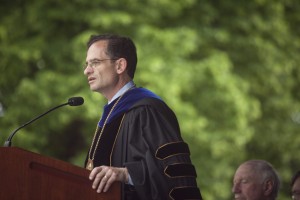
President Daniel Weiss speaks at the 176th Commencement.
President Daniel H. Weiss presented his farewell remarks to graduating seniors at the 176th Commencement.
You now have a college degree. What does it mean? What have you learned? What is most important? Worth careful reflection.
10 Things I hope you learned.
1. To believe that questions are almost always more important than answers. Insight and understanding come from asking the right questions.
2. To understand that however smart or insightful you are, there are always other perspectives that have merit. To embrace difference and appreciate that others can always teach you something is powerfully liberating and profoundly exciting.
3. To appreciate that the world is such an interesting place precisely because you actually know so little about it. A college education can provide a window to the world that enables a lifelong journey of learning and discovery. What you do next will depend on what you did here, but it will matter more.
4. To possess the confidence in yourself that you have the determination, discipline, and skills required to master any subject before you. It’s not about what you know, but rather what you can learn.
5. To reflect deeply on who you are, what you value, and what you believe to be important. I hope that your time here has helped you to grow—intellectually, socially, and personally.
6. To recognize that careful listening is generally more interesting than talking, even if it is becoming a lost art. But, the most important thing is to find the right balance between the two.
7. To discern the difference between cynicism and skepticism. Although it is relatively easy to become cynical in today’s world, there is not much value in it. On the other hand, skepticism can be highly productive and ultimately more useful in helping you to ask better questions and make better decisions.
8. To acknowledge that various approaches to understanding a topic inevitably adds breadth, depth, and texture to our understanding of almost anything. Taking a multidimensional or interdisciplinary approach often contributes to our knowledge in unanticipated ways.
9. To know that you can connect your world to that of others through empathy, curiosity, and especially the capacity to communicate clearly and effectively.
10. To accept with grace and humility your good fortune, and to appreciate that with wisdom and greater understanding comes the responsibility to use your gifts and this precious time you have to make a difference in the world.
In the eighth century, a Saxon leader from Northumbria recorded the following parable as he was trying to make some sense of a world in which he found himself but poorly understood. Written 14 centuries ago by a tribal chieftain, his words should resonate with you today:
“This is how the present life of man on earth appears to me, in comparison to that time which is unknown to us. You are sitting feasting with your ealderman in winter time; the fire is burning on the hearth in the middle of the hall and all inside is warm, while outside the wintry storms of rain and snow are raging; and a sparrow flies swiftly through the window and into hall…For the few moments it is inside, the storm and wintry tempest cannot touch it, but after the briefest moment of calm, it flits from your sight, out into the wintry storm again. So this life of man appears but for just a moment; what follows or indeed what went before we know not at all.”
So, I invite you to celebrate this moment and this milestone in your lives. For this is your time, the time of your lives. Use it well and make it count.

1 Comment
Comments are closed.